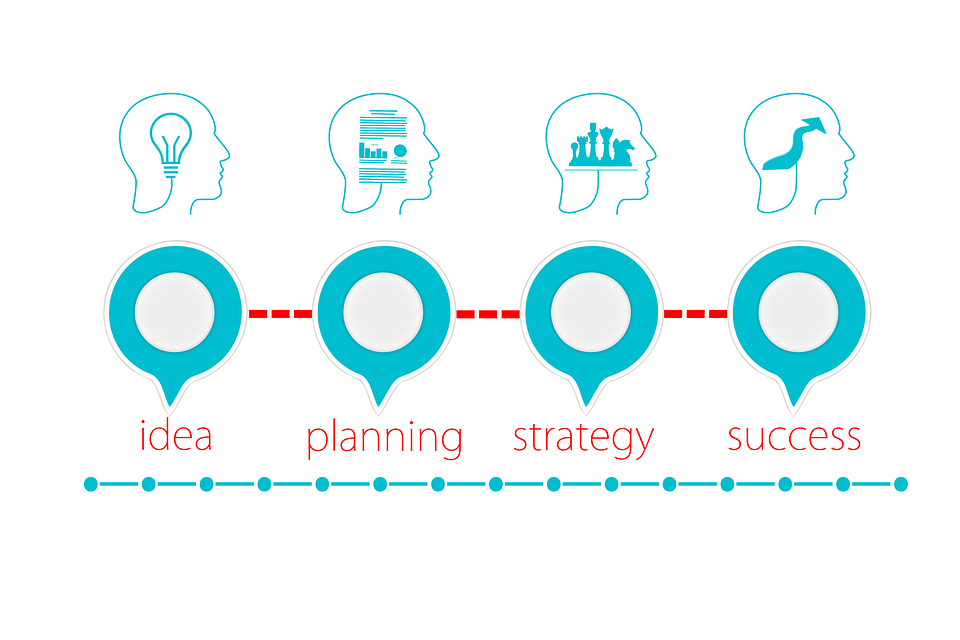Comprehensive Guide on How To Stop Overthinking For Good

You’d be lying if you said there has not been an instance in your life when you didn’t identify yourself as an over-thinker. At some point in our lives, almost all of us have gone through a frustrating experience of overthinking about something that simply refuses to walk itself out of our minds. Overthinking is an addictive yet ugly habit that has the potential to penetrate both the personal and professionals domains of your life. This implies that what you end up overthinking about can range from your personal relationships to your professional prospects. So your girlfriend left a casual remark about your haircut today and now here you are, lying in your bed with an endless stream of questions popping into your mind. Does she not like me anymore? Does she find me repulsive with this haircut? Am I not handsome enough to be with a pretty woman like her? Or worse, is she interested in someone else? It’s funny how you find yourself willing to cater to such questions and yet you won’t take a step back to question yourself where exactly is it all coming from, in the first place? Because if you did, you’d see that none of it is rooted in logic and facts and perhaps your way out of overthinking will be a convenient one. Similarly, you could have a bad day at work and have one of your reports widely disregarded by your superiors. Instead of seeing it for what it is, an over-thinker would trick himself into believing that his manager has a personal grudge with him, or that he can kiss his chances of a promotion this year a goodbye, or in the worst-case scenario, that he is a loser who is never going to find greatness and success. What’s common regardless of the scenario, though? You threaten your chances of getting a favorable outcome.
Blame it on the mechanical life that has become the new norm in this time and age with excessive pressure of the rat race or perhaps a natural trait, overthinking has been spreading like an epidemic among the human race, jeopardizing our mental health in general. The worst part is that it is virtually impossible for someone drowning in the sea of his own thoughts to realize that it is well within his power to let go of these thoughts and quit overthinking once and for all. If that’s you, we have good news for you. However addictive it may be, overthinking is just like any other habit and with persistence, patience, and practice, you can train yourself to reaffirm the control over your brain.
If you have landed on this page, congratulations on making the right decision at the right time that you would no longer let the curse of overthinking consume your life in any way. Facing the problem in a timely fashion is always a part of the solution. Now that you are convinced that overthinking has been hurting your personal and professional life in ways that can only be described as evil, you are motivated enough to go through our guide that promises to show you the way out of this ditch with implementation of the practical tips which have been tried and tested to be effective against overthinking. Letting go of this evil habit is a matter of how knowledgeable you are about different elements of overthinking. This is the very reason why we have chosen to craft this comprehensive guide that covers all aspects ranging from the reality of overthinking to the effects it casts on our lives, and the types of overthinking to, of course, the evidence-based strategies which pave the way for you to quit it.
Overthinking – A Brief Overview

In the simplest of terms, overthinking can be described as a type of negative thinking. The origin of overthinking is surely rooted in pessimism. The failure to fight negativity timely increases the risk of it exaggerating to the point where you end up losing control and can’t help but be overwhelmed by your own thoughts. This magnified version of pessimism is what is essentially known as overthinking.
It could be an innocent remark by one of your colleagues at work or perhaps even a close friend that triggers overthinking. Perhaps you are concerned about your professional growth, or the holiday weight that you are finding hard to shed, or an argument with your significant other that got stretched more than your expectations, so generally, anything that invokes the emotions like anger, anxiety, sadness, etc. are usually identified as triggers for overthinking. Once it is set into motion, you will slowly start to lose the sight of the original problem and associate unrealistic or even irrelevant interpretations and assumptions which activate a vicious cycle of negative thoughts into your mind. Consequently, it becomes increasingly difficult for you to let go of your thoughts and move on.
The aforementioned vicious cycle of negativity associated with overthinking is commonly referred to as the “Yeast Effect”. An over-thinker treats negativity as a dough and waits for it to be baked into twice the original size. For example, once you fail to meet your boss’s expectations in one of your presentations, overthinking can keep you focused at all of the times that you have failed in your life. The experiences of success may be remarkably greater in your life than those of failures, and yet your focus would only be confined to the few of the latter. This will ultimately lead to a gross generalization that you are not good at what you do. While it was a mere inconvenience of your professional life, thanks to overthinking, it is likely that your personal life will be brought into the loop as well. For instance, you will end up questioning why is it that your romantic partner chooses to be with you when you are evidently not good enough and he or she has the potential to do so much better. The “Yeast Effect”, therefore, makes you question anything and everything about yourself and your life unless you lose that last drop of self-esteem and conclude that you are absolutely worthless.
Another common feature associated with overthinking is that of the “Distorted Lens” effect. A distorted lens has a way of presenting an illusionary magnified version of a problem. You will likely build a habit of treating even a minor inconvenience as panic-worthy and will fail to find hope in any given situation. For example, a bad grade for your child at school will stem the thought that you are not playing your role as a good parent in the upbringing of your child. Seeing yourself as a bad parent further gives rise to panic that your children are destined to fail in the time to come. Ultimately, you decide to put the blame on your own parents and conclude that it all goes way beyond yourself. Overthinking has a way of devouring you slowly until a bad mood or a gloomy emotional state that’s filled with sadness, anger, and panic becomes a part of your personality. It pushes you into believing that it is a hopeless scenario and there isn’t anything that you could possibly do to fix things. Such a conclusion adds more fuel to the vicious cycle of negativity and serves to sustain it.
The Prominent Categories Of Overthinking

In order to devise an action plan to stop overthinking for good, it is important that you [restrict] understand the different types of overthinking and make the right identification of the type that you usually find yourself in. Such information can help a great deal in improving your chances of extracting maximum effectiveness out of your efforts to stop overthinking.
Have you ever found yourself obsessing over the thought that you have not been treated justly? You are convinced that you have been done wrong and that an act of revenge is in session? Perhaps you got rejected in a job interview and you started to blame the recruiters as being biased. The thought is so pronounced that the idea of suing them with the charges of discrimination sounds like the only relief that you can possibly find in a time like this. Then you can identify yourself as the “Rant and Rave over thinker”.
This type of overthinking is usually associated with cynicism and narrows your lens to always see other people as the antagonists. It disables you from learning their side of the story and exploring their perspective while entitling them as the villains. Don’t get us wrong, we are certainly not implying that feeling bad after being rejected for a job vacancy is not justified. But being impulsive to the point of self-destructive behaviors like that of planning revenge is what categorizes it as the evil of overthinking.
Another type of overthinking can generally be called as self-reflection going out of hand. In all honesty, self-reflection can only be thought of as a virtue since it helps to expand your perspective and gain a newer insight into a given situation or yourself. What distinguishes self-reflection from overthinking is that the former is purposeful. But then there are times when you ask yourself the reason why you are in particular trouble and instead of answering it with logic and evidence, you lose sight of the problem and associate a range of illusionary causes with each being more negative and destructive than the previous one. For instance, you may be looking for answers to why you feel depressed so that you can effectively find a solution to get rid of it. But answering it with the reasons like, “nobody likes to be my friend, “everyone hates me”, “I am not good looking”, “I’m a failure at work”, etc. can’t do you any good now, can it? Such a type of overthinking is known to fuel bad decisions like getting into an argument with a loved one for no apparent reason.
Lastly, chaotic overthinking is every bit as it sounds; chaos going on in your mind. You can think of it as a flood of often unrealistic, unrelated panics causing an utter obliteration inside your head. Do you ever feel too paralyzed to go about even your routine tasks for the day because the gloomy season has knocked on the door of your mind again? Those episodes when you find it hard to understand your own self and how you feel? The times when it is seemingly impossible to unravel your own thoughts and an “I just don’t know anymore” is your answer to anything and everything? Yes, this is what the chaotic overthinking can do to you. Such a type of overthinking comes in two different flavors; an excessive rumination of the past or an unjustified panic about the future. With an uncontrolled need to overthink about every minor detail of your life, chaotic overthinking can turn into addiction both virtually and literally since such individuals are likely to find relief in drugs or alcohol in hopes of suffocating their own thoughts and putting their mind to rest at least for a little bit.
The Detrimental Effects Of Overthinking

The effects of overthinking are greatly detrimental scrutinizing the personal and professional life as well as your physical and mental health. Simply put, overthinking can make your life significantly harder than it has to be. The reason being that overthinking has a way of magnifying your problems so you would see them as bigger than they are. The bigger you think is the problem the more complicated are you likely to find it to solve. What’s more, is that since overthinking has a way of clouding your better judgment that makes it even harder to get to an applicable solution to your problems. This leads to poorer decisions which hurt your personal relationships in the long run and begin to shrink your professional prospects. Overthinkers are likely to find it hard to communicate their problems in an attempt to find an effective solution.
But that’s not all. Overthinking has been associated with a leading cause for common mental disorders including anxiety and depression. As evident from the aforementioned information, overthinking confronts you with excessive stress on a day to day basis. Stress is already a common experience for all of us living in the fast-paced era of today. For most of us, however, the natural coping mechanisms are more than sufficient to get over it. An over-thinker, on the other hand, finds it harder to manage stress and a prolonged experience is usually transformed into depression. The over analyzing and focusing on everything that could go wrong or that went wrong in the past makes an over-thinker see a threat in virtually all scenarios and people around him. If you think about it, part of the reason why people fall in the ditch of alcohol/drug abuse, and other relevant unhealthy lifestyles is the hope of finding an escape from their own thoughts and be relieved of the constant pain.
With excessive stress and depressive thoughts which just won’t quit, overthinking makes it hard for you to get a good night’s sleep as well. The sleep span and pattern will continue to shrink and give rise to insomnia that further robs you of your cognitive capacities. You would no longer be able to relish the usual productivity and creativity in your routine tasks making it even harder for you to hit your goals and get the tasks done on time leading to an even pronounced feeling of being a failure.
As evident from the information mentioned above, over thinking puts you in a tunnel that has no light at the end of it. It turns each of the molehills in your life into a mountain, one that you will always fail to climb regardless of how hard you try. Part of the reason why children are naturally happier and more satisfied with their lives is that over-thinking is an evil that usually hits you in the teenage and after. What’s important to realize is that thinking, over thinking, or even super-over-thinking does not have the potential to serve as an alternative to action. You can spend 24 hours of your day on thinking and it won’t make any difference unless you get off that couch and actually do something to achieve your goals and transform your life in the way that you desire. All that over thinking can do for you is steal the “life” out of your life. And there’s nothing worse than being alive and yet not feeling so.
The Reasons Why We Overthink

There is no argument over the fact that the reasons why may lead to an overthinking mind are not only plenty but are highly variable. The reason why you are stuck with this evil may be entirely different than the reasons why your friend usually finds himself overthinking about his life and choices. This makes it even harder for an over-thinker to open the gate for communication since there’s always an underlying fear of judgment as he is afraid that people would not be able to understand him. Blend it with a mind that is used to overthinking in the first place, and the fear is of judgment becomes so gigantic that communicating, discussing, and sharing the thoughts even with the loved ones, stops sounding like a good idea.
Nonetheless, psychologically tells us that there are a few prominent reasons why people may find themselves overthinking about their past, present, or the future. To begin with, we are living in an era that encourages questioning. From a very early age, a child is now told to not take anything for granted and raise a question on anything and everything. While the purpose of such a culture was to build intriguing minds and improve their capacity for innovation, it isn’t always as safe as it sounds. A side effect of such an approach has been a generation that is not sure about its parents’ values, social norms, or even religion. For the most part, all of our life choices are based on such factors. Rule them out of your life and what do you think are you left with as a platform that directs all of your life choices? Simply put, it turns more into like making decisions in a vacuum. You lose the support at the backend that strengthens your decisions. Consequently, you open the door for overthinking since you are never sure of whether or not you made the right choice.
Other than that, a crucial factor that has directly been associated with overthinking as per the psychological research is that of entitling yourself to things like happiness, success, and money. Once you have such an irrational entitlement, you would always find it overly unjust for anyone or anything to come in your way and hindering your path to what you think you deserve. This creates a problem since there’s no end to human desires. You could have the world at your disposal and yet your mind is going to trick you into entitling yourself for more. This causes a shift of focus from what you already have and how satisfying it could actually be, to what you lack and the factors which are barricading your way to realizing your next desire. As evident, it is synonymous to being ignorant of all the positivity in your life and clinging to the negativity that is surely going to take the form of overthinking with the passage of time.
Imagine that you are driving an old car that has been giving you a few issues lately. Deep down, you are well aware that it needs to properly see a mechanic in order to get to the root of the problem and fix it for good. However, in the light of your hectic schedule or lack of time otherwise, you only opt for getting it tuned in a few minutes and continue to use it for your routine tasks. Under such circumstances, what do you think is the final destiny of your vehicle? Isn’t it fair to state that sooner or later, it’ll have the engine hauled, would refuse to fire up the engine, and you would no longer be able to use it unless it is thoroughly examined and fixed, which by the way, is now going to cost you a lot more in terms of time as well as money. The same example applies to how you are lead to the destination of overthinking. Unfortunately, the fast-paced life of 2019 doesn’t come with no strings attached. Excessive stress, anxiety, challenges, and complications are a part of our lives today. In order to sustain our mental health in a whirlpool of all of these factors which are ready to devour it, a comprehensive and in-depth plan of action is required. But who even has the time to invest in their mental health, right? It would perhaps have been different if only it were the physical health. But how many of us tend to take our mental health any seriously in this time and age? The priority choice of action for our mental health for most of us is usually the shortcut. Take a Xanax and sleep, opt for other drugs, go for binge shopping, drown your thoughts with alcohol, etc. As such, all of us have indulged in a frenetic activity like these in the name of giving ourselves a “break”. What we fail to realize, however, is that all of such options can only serve as a temporary solution. Over time, as you refuse to invest your time into finding the root problem and devising an effective and implementable strategy to rejuvenate your mental health, it aggravates and takes the form of overthinking.
There is no second opinion to the benefits that the journey to self-awareness has to offer. Expressing yourself in an attempt to know yourself better, finding the meaning and purpose for your life is sacred for sure. But what are we taught since our childhood? Anything done in excess can never be good for the human body. Even if it is water that is known as the essence of life. You are required to keep yourself well-hydrated. You consume a few glasses of water every day and it’ll go a long way in keeping you healthy. But the moment you start to consume a few gallons of it every day, your body will surely present the signs and symptoms that something unnatural is being done to it. Similarly, being too overwhelmed with your journey to self-awareness to the extent that you start to question every minor detail and hyper-analyzing each of your tiny emotions starts to push you slowly towards the evil habit of overthinking.
All of the thoughts, feelings, and emotions that we experience on a day to day basis can essentially be thought of as networks inside our brain. For example, you’ll have a different network inside your brain that stores your thoughts regarding your friends and family and personal relationships while a whole another network that primarily stores the work information and your thoughts and emotions associated to it. These networks of thoughts are further linked to our feelings and emotions. For instance, if you are having a great day that is filled with fun, excitement, and happiness, it will activate the network that stores the relevant experiences that you’ve had in your life. Consequently, your focus will stick to positivity leading to greater life satisfaction and overall quality of life. On the other hand, if you are consistently in a bad mood, you are giving a greater opportunity to the network of negativity to be activated. Failure to manage your mood will, therefore, put you in the middle of this network. With a focus on everything that has ever gone wrong in your life, you will find yourself running low on hope and energy while wasting all of your time on overthinking rather than being active in fixing things and reestablishing your mental peace.
Lastly, a malfunction in one of the components of our brains can also improve the likelihood of why you tend to overthink. Such a malfunction could be an outcome of any number of things. It could be a trauma that you recently went through, or perhaps a devastating experience of the past that disturbed your psyche. Excessive stress on a daily basis, peer pressure, anxiety, and depression can also cause a similar malfunction. For instance, it could be a malfunctioning prefrontal cortex that has disabled you from regulating your emotions effectively and has introduced you to overthinking. Or perhaps it could be hippocampus or the amygdala that has caused a disruption in your memory or learning capacities with an identical outcome as mentioned before. As per the research, the aforementioned medical reasoning may also offer an explanation to why some people have a natural proclivity towards overthinking while others find it easier to get over it. Under such circumstances, the need for seeing a mental health professional and going through therapy or an otherwise plan of treatment is accentuated for effectively coping with the curse of overthinking.
How Do I Know If I’m An Over Thinker?

An important thing to understand is that there is a prominent difference between overthinking and worrying. While both are closely related, worrying is a natural emotion for human beings while overthinking is a largely evolved version of the former. Being worried about something that may go wrong in the future and cause an inconvenience for us is an experience that none of us are free from. But you are an over thinker if you the time to come is not the only matter of concern for you but what has already passed eats up a lot of your mind while you are perfectly aware that there is nothing that you can do about something that has already happened. An average person would worry about something that could go wrong in the future. An over-thinker, on the other hand, would be sure for the most part that something terrible has either already happened or is destined to happen sooner or later.
Similarly, some people would also confuse overthinking with Obsessive Compulsive Disorder (OCD). Obsessing over tiny details or situations that are insignificant to other people is a common trait for people with OCD. For instance, having a relentless thought about whether or not you turned the stove off before you left your house may be considered as a stem of overthinking while on the contrary, it falls in the realm of OCD.
Lastly, an over-thinker may try to calm his nerves by giving it the name of contemplation or deep thinking. In reality, however, it couldn’t be farther from the truth. Deep thinking invokes interest in understanding your emotions, your feelings, and being in touch with the inner self in an attempt to know one’s self better. It has more to do with self-awareness, as mentioned before. Overthinking, on the contrary, is like having a distorted view of your life; a view that is filled only with negativity. It doesn’t help in understanding your emotions or devising an effective solution to cope with the negative ones, rather keeps your focus only on the negative emotions and feelings with no plan of action that leaves you exhausted at all times.
Now that you know that overthinking may be closely associated with a range of other conditions, it is justified for you to question how exactly are you going to make it convenient for you to realize if you are an over thinker. We promised you right at the beginning of this guide that we’ll answer all of your questions regarding overthinking and it is time for us to keep our promise. Before moving on to the strategies, tips, and tricks which you can start to use in an attempt to climb out of the ditch of overthinking, it is important that you find out if you can identify yourself as an over thinker in the first place. We have highlighted a few of the simple questions below, answering which can provide an insight into whether or not you are an over thinker.
- You spend a lot of time worrying about what could possibly go wrong in your life. Be it in terms of your relationships, your career, your health, your family, there’s always a worry going on in your head?
- You often find yourself stuck with the matters of the past which are beyond your capacity to change regardless of how hard you think about them?
- You hate surprises when it comes to planning for your future and so you prefer to think of the worst case scenario that could happen to you in the future?
- You find yourself too consumed in the “What Ifs” rather than focusing on “What Is” and making the best out of the available resources?
- You cook up problems in your head which haven’t even happened in reality and try to think of a solution. It is a matter of extreme stress for you when your solutions fail to satisfactorily answer the imaginary problem?
- Even if you find a solution to your imaginary problem, it is common for you to ask yourself to cook up an alternative solution because you think that the probability of the previous solution being effective is not appreciable?
- Your friends, family, loved ones, and even sometimes acquaintances highlight the fact that you think a little too much?
- You are never too sure of your decision that procrastinates action since you it is hard for you to carry on with a decision unless you are 100% sure that it is the right one?
- You have an uncanny need to be free of all flaws and reach perfection in whatever you do. Failure to achieve it is a matter of extreme stress and anxiety for you?
- It is common for you to over-plan for any given scenario. You wish to explore all possible options which ultimately confronts you with a severe confusion owing to the complication of choosing a single one that you deem the most suitable?
- Superstition is your best friend. You are convinced that if you let go of your thoughts now, you will definitely have to regret it later.
- There is no difference in terms of the intensity of your approach towards a given situation regardless of how simple or complicated it is?
- Mood swings is not an idea that’s novel to you. You identify yourself as cranky or easily irritable.
- It has been getting increasingly difficult for you to get a good night’s sleep. Lying there on your bed with eyes wide open and staring the ceiling for hours is the new normal for you?
- You have been diagnosed with a common mental disorder such as that of anxiety or depression. Or you may be a victim of a strained relationship or suffering from substance abuse.
- It has been getting increasingly difficult for you to focus on a given task. You feel unmotivated and passive for the greater part of your day. The thoughts of being alone and the frustration of never finding an escape from your own thoughts is a regular experience for you?
- Your entire focus is usually stuck on your failures, mistakes, shortcomings, and faults with positivity never finding a place to stay in your head. Sadness and anxiety is just a part of your personality now?
- You beat yourself up every day for not having it in you to pull yourself together and handle things more effectively?
Answering all of the questions along the line of the ones mentioned above can help a great deal in identifying yourself as an over-thinker. If you find yourself answering always, often, and sometimes to the majority of the listed and other relevant questions, there is a good chance that you are an over thinker who is in dire need of devising an evidence-based action plan to get rid of this evil.
Strategies To Quit Overthinking Forever

This brings us to the last and most important part of our guide; the top strategies which you can start implementing from today in an attempt to quit overthinking once and for all. Truth is, you have already suffered enough. Your personal relationships and professional prospects have suffocated at the hands of overthinking a lot. But not anymore. It is time for you to part your ways from this evil and add the flavor of happiness and satisfaction back to your life. Our experts have spent hours into researching and collecting the evidence-based information to craft this list of tried and tested strategies which are destined to pave the way for you to quit overthinking. Without further ado, let’s take a closer look at the tips and tricks and get your journey started right away.
1. M For Mind Games, M For Meditation

We have already established that overthinking is merely a form of mind game that your own mind plays with yourself. It tricks you into being excessively negative and hopeless. Your troubling and disturbing thoughts find a home inside your head and refuse to let you partake in activities with the same passion and energy. It sucks the life out of you and leaves you exhausted with a negative vibe that has no room for productivity and creativity.
Whenever you are confronted with a situation that has your mind playing games with you, you can take it for granted that meditation and mindfulness are going to be the easy way out. The practice has its origin in the Buddhist culture that was realized some hundreds of years ago. And yet it is practiced by people from all over the world with no discrimination in terms of caste, creed, or religion. When a certain practice survives for that many years and receives accreditation generation after generation, you can be confident that the effectiveness of such a practice is not to be questioned.
The best part of meditation and mindfulness is that it doesn’t require a lot of resources or equipment to be practiced. There is no need for a coach, although, you can opt for one voluntarily if you want. You don’t have to visit a gym on a regular basis. There is no amount of equipment that you need to purchase. And most importantly, it doesn’t take hours of your time on a day to day basis. For the most part, all you need is a silent corner in your house or even in your office where you can sit in peace with yourself and shift your entire focus on a harmless event that is happening in the present. For instance, you may be required to focus on your breathing as you deeply inhale and exhale the air out of your body. Or you may focus on the contraction and relaxation of your bodily muscles. You can also use a symphony or a peaceful sound like that of falling rain as the point of focus in an attempt to remove all of your troubling thoughts out of your mind.
Meditation and mindfulness are known to activate the natural relaxation response of your body, restore your mood via stimulation of the happy hormones, collect your thoughts from the past and the future to bring them back to there here and now, refresh your brain and recharges its battery to perform optimally in the present moment. With such benefits at your disposal, you can be sure that a few minutes of meditation on a regular basis will leave no room for your mind to overthink as it’ll entirely be consumed by positivity.
2. Work On Your Approach To Decision Making

Take any example of the time when you were so caught up in overthinking while making an important decision of your life and you’d see that the only reason why you were having a hard time quitting, was because you wanted to protect yourself from making the wrong decision. Of course, you wanted to avoid the embarrassment, failure, or a negative outcome in general that were afraid of facing in case of a wrong decision. But here’s the thing; the reason why you are usually scared of the wrong decision is that your perspective is that of an ultimatum. With every minor decision, you tell yourself that you either have to get it right or else you will end up losing everything.
A simple change in your approach to decision making can help a great deal in quitting overthinking. The next time you have to make an important decision, instead of taking it as an ultimatum, take a step back, relax, and remind yourself that there is no negative outcome associated with this decision in the first place. If your decision turns out to be the right one, well and good. But even in an event that you find it to be the wrong one, you will get an impeccable opportunity to learn. Remind yourself that this learning is imperative for your personal and professional development. Without learning from your experiences of life, you are essentially confining your personality into a small box.
3. Walk Out Of The Illusion Of Perfect Timing

Here’s another common reason for overthinking. The majority of us fall into overthinking because we are always waiting for the perfect time to act on a plan that we have in our minds. For instance, you may want to start a business, you’ll perhaps be very excited about it as well. But just when you think of implementing the idea, your mind will begin to ask questions like do you have a backup plan for when the capital runs out? Do you have a fool-proof strategy to gain customers? Are you sure that you have the time to commit to a venture like this? Do you have what it takes to make a business successful? In search of the appropriate answers to such questions, you start to spend all of your time with your thoughts while none of it is left for actually going through with it.
As such, an easy way out of overthinking is to constantly remind yourself that the whole idea of “perfect timing” is nothing but an illusion. Whatever it is that you want to accomplish, be it getting married or starting a business, having a baby or switching your job, you will never be able to identify a time for it that you can regard as perfect. In all honesty, though, the whole excitement and thrill of it are also concealed in taking the leap of faith and seeing what comes your way as you go through with it. To find your way out of overthinking, you have to turn the table and learn to be impulsive instead.
4. Put An Effort Into Finding Positivity

Yes, we have already talked at length about how overthinking is primarily a lack of positivity and negativity that surrounds you completely. An overthinking mind is entirely stuck on all of the scenarios which could go wrong in the time to come until you end up being hopeless about the situation since you are convinced that there is not even a single way that it could work for you. The funny thing is that whatever you think could go wrong is not always going to be irrational. At times, it will actually make sense and if you are being honest with yourself, you’d actually be able to see that there is a probability of it happening in reality.
The important thing to realize, however, is that the probability is not confined to the negative outcomes only. Provided that you are willing to put an effort into it, you’d be able to find a wide range of positive outcomes as well all of which will be based on logic and evidence. An average mind has the capacity to keep a balance in highlighting both the potential positive and the potential negative outcomes of an action. An overthinking mind, however, is stuck on the latter with no room left for the former.
Therefore, all you have to do to find the light at the end of the tunnel of overthinking is to not just count on your mind to think of the positive scenarios all by itself, but put a deliberate effort instead, into thinking of how the situation could end up being positive. Sit with yourself in a silent, peaceful corner with a paper and a pencil. Take your time and try to jot down all of the positive outcomes that you can associate with your decision or the action that you are about to undergo. As your list of positive outcomes continue to enumerate, overthinking and negativity will start to disappear making room for a rush of hope that reenergizes you to rekindles the passion that you were missing in life.
5. Focus On The Bigger Picture

Overthinking has a way of shrinking your perspective and confining it to a very narrow state of mind. This is part of the reason why every other inconvenience appears to be gigantic to an overthinking mind. It tricks you into associating importance or significance to a thing that is unrealistic, to say the least. For instance, if you had an argument with your best friend, it is more than likely that your friend has already forgotten about it since that’s how close friendships work. But you would still be here beating yourself for having the argument in the first place. You would be tricked into believing that your relation with your best friend will never be the same again. That’s how magnified your minor problems appear to be if you are stuck in a loop of overthinking.
The solution, therefore, is to practice shifting your focus to the larger picture. Whenever you find yourself overthinking about a problem at hand, find a peaceful environment to have a conversation with yourself and ask if the problem would matter to you in the next 5 years, months, weeks, or even days, for that matter. More often than not, once you realize that the answer is a big fat NO, it starts to get easier to let go of all the disturbingly relentless thoughts which have been making life gloomier for you.
6. Time To Take The Leap Of Faith

A common characteristic of overthinking is known as analysis paralysis in the language of psychology. It is the point where such an excessive analysis of the situation has already been made that no amount of further analysis can help in any way in making the right decision. All that is needed from there on is the action on one of the devised strategies.
Learning to take the leap of faith and being impulsive can help a great deal in pulling you out of the vicious cycle of overthinking. So the next time when you are confronted with a hard choice and being an over-thinker, you find yourself analyzing every single angle of the problem at hand, tell yourself to take the leap of faith and go through with any of the available solutions.
The benefit of such an attitude is multifold. Firstly, there is a good chance that you were just being paranoid and the decision that you finally decided to implement was the right one. Even if it wasn’t, it’ll provide you with an opportunity to not only learn but to also summon your ability to improvise which plays a crucial role in your personal and professional development. So, on one hand, you are finding a solution for overthinking and transforming your personality into the doer and not the talker-only, while on the other hand, you are learning to be more impulsive as well.
7. Running Away Has Never Helped Anyone

One of the worst things that you can do to yourself as an over thinker is running away from your own thoughts. It has never helped anyone in history and it will never end up being favorable for you either. The more you try to run away from your disturbing and troubling thoughts, the more are they going to pop up in your mind and make your life miserable.
Being rational and finding a logical solution is what is required for you to quit overthinking for good. Instead of trying to be ignorant of their existence, welcome these thoughts and hold a purposeful debate with yourself to see if they are helpful or not. For instance, you may be overthinking that you will definitely fail in the interview that you have the next morning even before you have sat in it. Instead of being frustrated at yourself for having such a thought, sit yourself down and ask if such a thought is going to help you in any way. Would it reduce the chances of failing in the interview? In all honesty, as per psychology, it will activate a self-fulfilling prophecy that will end up improving your chances of failing in reality.
So, if anything, overthinking is only affecting you negatively. Once you remind yourself of that with an example, you will then be able to give the charge back to your mind and make it work in your favor by wiping overthinking out of it.
8. Effort Is More Important Than Outcome

You have been trapped with overthinking so you are in a better place to answer this question. What is the matter of concern for you when you are overthinking? Is it what you are doing in the present? Or is it pretty much always the outcome of what you are doing that’ll present itself sometime in the future? If you are being honest, the answer will surely be the latter. No one overly worries about the action in the present. It is almost always the thought of what is going to happen in the future that scares you.
In order to quit overthinking, you have to remind yourself to keep your focus on the effort. How hard you are trying to fix the problem, how much of an effort are you putting into making the right decision. Tell yourself that you are going to do your level best and will be prepared for whatever is thrown your way as a consequence.
Yes, of course, it is not going to be easy since such reminders and thoughts are exactly what’s blocked for an overthinking mind. But it is also true that such thoughts won’t arise naturally. Once they are forced externally, you would be able to take help from them. And that external force is going to be this guide. As you go through it, it will remind you to keep your focus on the effort and remove it from the outcome which will lend you a helping hand in parting your way from overthinking.
9. It’s Okay To Not Have Control

Here’s the root of all of your overthinking about the future. The point is that you want to have complete control over your future. You want to plan for every possible occurrence, you wish to have a backup plan for all of your original plans for the future and perhaps even an additional backup plan for your previous backup plan as well. It is only humane for us to try our best to remove all possibilities of unexpected surprises in life. Generally speaking, there’s nothing wrong with having a desire for a stable and secure future. But the moment it gets on your nerves to an extent that you forget to enjoy the present is when you know that the water is starting to go above your head now.
Accepting the reality for what it is can be a way out of the evil habit of overthinking. Instead of focusing on ensuring complete control over your future, start feeding it into your mind that there is no way to accomplish that. Regardless of how hard you try, how deep you go with the analysis, and how much you worry about your future, there is no way that you can completely rule out the possibility of surprises. Instead, ask yourself this. What’s the point of worrying about the future when it’s given that you can’t have complete control over it. You can spend all of your “present” to plan for your future but try to understand that your future will someday be your present. You will spend that present trying to plan for the next future and so on and so forth. Along the process, all you are doing is forgetting to live the moment right now.
10. Give Yourself An Ultimatum To Make Decisions

Imagine that you were given five different career options and were asked to choose a single one. No one ever told you that you have a particular amount of time to make your decision and go through with it. How long do you think it is going to take you to make the decision? For an average over-thinker, it would perhaps even take months before he can finally give you his answer. Why? Because he knows that there is no ultimatum and he can think and analyze the options all he wants unless he is 100% satisfied that he is making the right decision. Since 100% satisfaction is nothing but an illusion, the decision will be procrastinated beyond imagination.
On the other hand, if you were given the same option and were asked to decide within 24 hours, it is next to impossible that you will fail to make the decision in the allotted time. Such is the power of having an ultimatum. Don’t get us wrong. We are not supporting making rash decisions in any way. You can define an ultimatum on the basis of how long it should take for someone to make the decision. Give yourself a sufficient amount of time to make the analysis and evaluate the options. But the ultimatum will surely make it harder for you to get into over analysis and evaluation of the options. This is what shuts the door on overthinking.
11. When In Doubt, Exercise

Did you know that among the million different benefits that regular exercise has to offer, a prominent one is showing you the way to overcome the bad habit of overthinking? Yes, physical workouts are not confined to being effective for your physical health but these are equally useful for your mental health as well.
To begin with, getting indulged in an intense workout will require you to be entirely concentrated on the exercise. This will leave little to no room for your mind to wander around in the thoughts of past and the future and continue overthinking. Secondly, exercise has been shown to be effective in stimulating the release of endorphins in your body. Such a group of hormones which are collectively known as the “happy hormones” is effective in inducing positivity as well as feelings of happiness and contentment which is likely to prevent the troubling thoughts from pushing you into overthinking.
12. Learn To Practice The Problem Solving Attitude

The thing about overthinking is that it is always disorganized. It’s like a traffic jam inside your head. Thoughts are coming from all sides of the intersection and you just don’t know which one to cater and which one to let go. This is why learning to be organized can help a great deal as a strategy that keeps overthinking at bay.
For instance, instead of letting all thoughts wander around in the compartments of your brain like a welcomed guest, sit with yourself in a peaceful environment with a paper and a pencil and start to jot down all of it that concerns you at the moment. What is it that you are worried about? Write all of it in a single column.
Once you are done, make another column and try to think of one thing that you can do to bring yourself closer to a solution of each of the problems listed in the first column. Not a thorough, step by step guide to solving each of your problems. Just a single thing that will make things at least a little better.
Overthinking clings your focus to worrying without giving you the room to cook up a solution. With the help of the above activity, however, you can turn your worries into an action plan aimed at making things better which will ensure that you worry like everybody else and not turn to overthinking for every other matter.
13. Broaden Your Hobbies

Isn’t it possible that the reason why you spend so much time overthinking is that you have a lot of time, to begin with? If so, keeping yourself busy specifically in the activities that you love doing should be effective as a solution for overthinking. You may have been tricking yourself into believing that you are stuck with a hectic schedule and there is hardly any time for you to indulge in your hobbies. But here’s the thing; if you have enough time to overthink, you certainly have enough of it to enjoy your hobbies as well.
Ask yourself, what is it that you love doing? Is it reading a book? Watching a movie? Hanging out with your friends? Playing a sport? Whatever it is, it’s time for you to do more of it. The moment you find yourself leaning just a little bit towards overthinking, turn to your hobby and you will see the troubling thoughts vanish in no time at all.
It is even more beneficial if your hobby is that of reading a book or perhaps playing a sport. Because with such hobbies, you can effectively fight overthinking on one hand, while optimizing your physical and cognitive capacities in the meantime as well.
14. What’s The Worst That Could Happen?

There’s a worst case scenario that your overthinking makes you believe to be possible and then there’s a realistic worst-case scenario. If you can only put an effort into focusing on the latter, you would be able to see that things aren’t as panic-worthy as you have been thinking of them to be. Such a realization is all one wants, for the most part, to get rid of overthinking.
For example, you have an interview in the morning for a new job. What’s the worst case scenario even if you don’t get it? You will be stuck with your current job for a few days longer and will have to keep on sending your application for different jobs for a little bit longer. That’s it. You are not going to die.
Simply put, the moment you actually focus on the worst-case scenario rather than taking the one that your overthinking is presenting for granted, you’d be able to see that the situation isn’t as a grave. As soon as the truth hits you, overthinking will have to pack its bags.
15. Turn To The Mother Nature

You could spend thousands on medication for stress relief and yet nothing would ever be as effective as the Mother Nature itself. Being closer to nature has a way of sending a rush of refreshment down our spines, recharge our batteries, and calm our nerves. You’d regret if you underestimated the role that nature could play in pulling you out of the loop of overthinking. Stuck with your thoughts again that is sucking the life out of you? Get off that couch and go take a walk by the river, or perhaps in a park nearby with children playing around. For that matter, go spend some time on the beach. Whatever it takes to connect with nature and get some fresh air, do it. You may also want to listen to your favorite music on your way as well. It’s hard to explain how, but you just have to try it to believe the way that nature can help you quit overthinking temporarily.
Final Words
Being worried about the future or overanalyzing the past occurrences is a common experience for most of us. From time to time, all of us are involved in overthinking a bit. But if the occurrence has started to become an innate part of your personality to an extent where it refuses to shy away from consuming your life entirely, then it is surely time for you to put a deliberate effort into fixing things.
Like all bad habits, overthinking is one that can be easily overcome as well, provided that you have the information as well as a plan of action to hinder its path. We have tried to be as comprehensive as we could in this guide to quitting overthinking in hopes of putting all the information that can possibly be useful for you to get out of this trap.
The 15 simple strategies are evidence-based, tried and tested tips which can show you the way out of overthinking. Keep it in mind, though, that things won’t change overnight. You have probably been overthinking for years. And a habit that is as deeply rooted as overthinking will surely take a bit of time and a lot of effort, patience, and persistence before you can walk it out of your head. So, stick to the plan and keeping practicing the tips mentioned in our guide. Hopelessness will definitely try to surround you, but remind yourself that you will get there eventually and continue your journey.
If only you have it in you to stop yourself from quitting the effort, you will destine yourself to quit overthinking with the passage of time. [/restrict]


Pingback: Stop Overthinking Career Progress & Life Success Self-Control Guide Launched | SproutNews
Pingback: Why Do I Overthink Everything and How to Stop It - 123 REPUTATION MANAGEMENT
Pingback: Ways How to Stop Overthinking Anxiety | Cyber Land Website